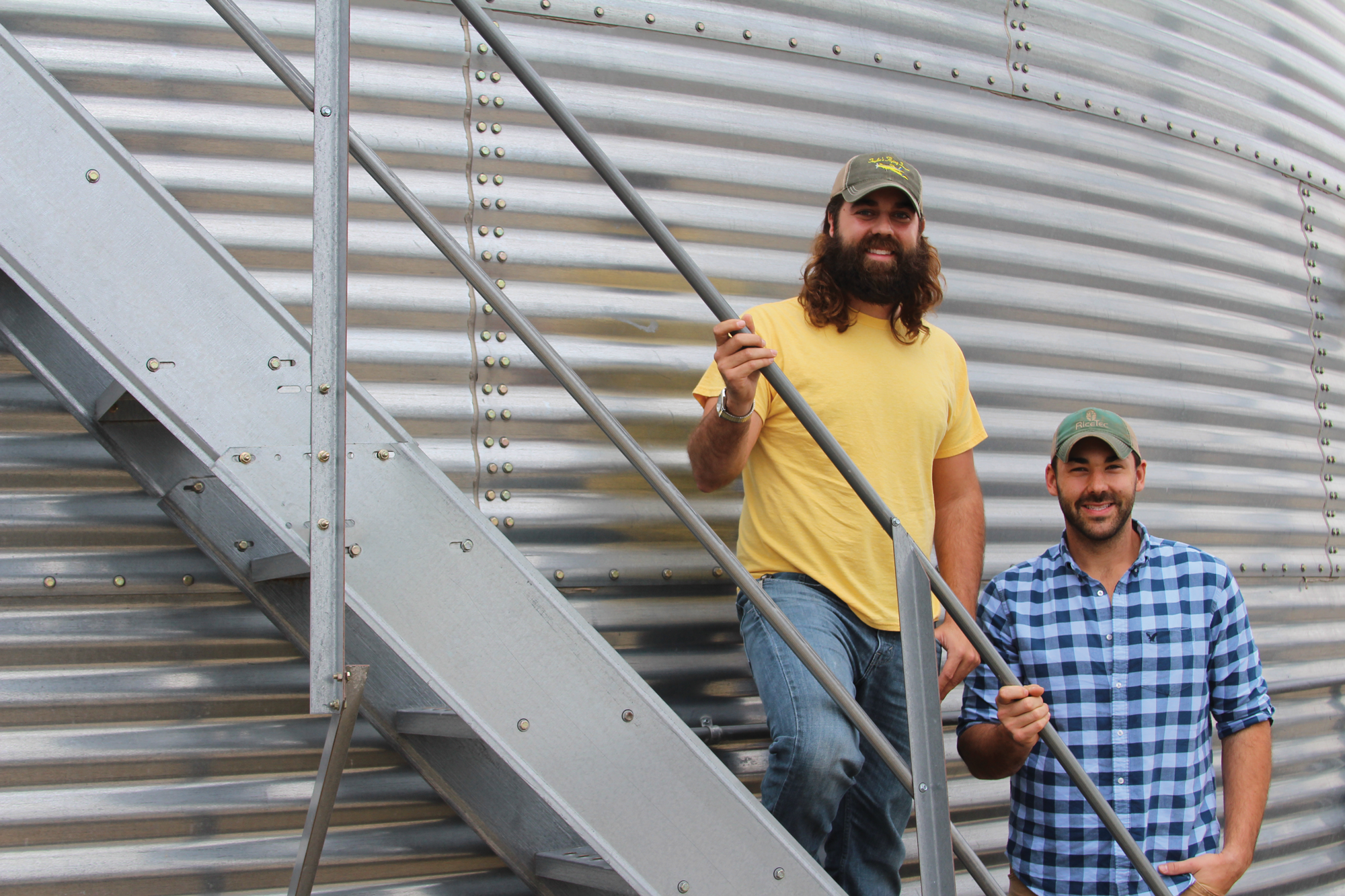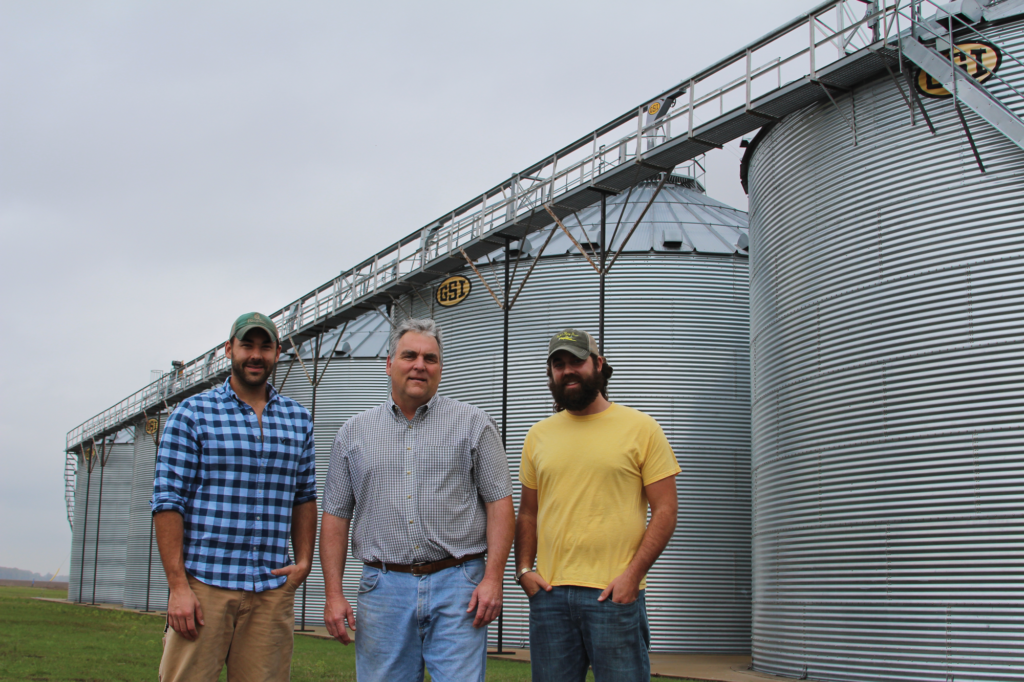
Brothers Partner to Start Farming Careers
July 24, 2016
Written By Adam Buckallew
Farming profit margins look slim for the 2016 crop year, but that’s not dampening the enthusiasm of Drew and Luke Mitchell. The downturn in the agricultural economy has provided the Mitchells with a golden opportunity: the chance to rent 800 acres of farmland in central Arkansas. As older farmers look to retire or rent out their land due to the current tough pricing environment, it is providing a chance for beginning farmers, like the Mitchell brothers, to pick up land.
Access to land is one of the most significant barriers to kick-starting a farming career. According to a U.S. Department of Agriculture survey of land values from August 2015, farm real estate is valued at an average of just more than $3,000 per acre. In some areas of the Corn Belt, it goes for as high as $6,350 per acre. Considering most young farmers have limited access to capital, it can be hard to find acreage that is affordable to farm.
“I really think this is one of the only times we could’ve gotten into farming,” says Drew. “If everything was still really good, you wouldn’t see people wanting to get out or people being forced out like they have been. I look at it as a blessing to have the opportunity. Yeah, it’s going to be tough as we’re starting out, but once prices start to rebound, we should be in a decent position to succeed.”
The Call to Farm
Scott Mitchell never encouraged his boys to farm. He didn’t want them to feel pressured to follow in his footsteps. If they wanted to farm, Scott wanted it to be their decision.

“If a person doesn’t want to farm or they aren’t sure if they want to farm, they shouldn’t do it,” Scott says. “The people that need to farm are the ones who just aren’t happy unless that’s what they are doing. You’ve got to be in it for the long haul. There are years that we pay to farm, there are years where we break even and then there are some when we make money. It’s a marathon.”
Drew, 28, and Luke, 26, both left the farm after graduating from high school to attend college and seek careers outside of agriculture. Their experiences away from the farm only served to reinforce their desire to return to farming.
“I was working out of an office selling insurance for a time,” Drew says. “It didn’t suit me. I missed farming.”
Luke also figured out he wanted to return to the farm after a brief stint away.
“Farming has always been in the back of my mind,” Luke says. “I got a degree in psychology and was working at the probation and parole office in Conway, Arkansas. I quickly found out that wasn’t what I wanted to do every day for the rest of my life. That helped me make up my mind about farming. It’s not always easy, but it’s something that I enjoy.”
Scott gladly welcomed his sons back into the family farming operation.
“This is what they wanted to do. I couldn’t tell them no,” Scott says. “They both have college degrees, but they wanted to farm. We’re fortunate enough to have a family farm but we were thankful that this opportunity came along for them to rent their own land. To find 800 acres like they did, that’s pretty fortunate.”
Opportunity Calls
The way prices were trending in 2015, Scott had a feeling his sons would eventually find an opportunity to acquire land.
“There’s so many older farmers, and those guys can’t farm forever,” Scott says. “We knew a few bad years would probably open up some acreage. When beans are at $12 and corn is at $5, people won’t quit because they are making money. They may be 75 years old, but they don’t want to retire because they’re making money. When things get bad, those older guys see they can rent their land out while still turning a profit with no risk. That opens up opportunities for young farmers who are looking to rent land. The trick is, you’ve just got to be able to stay in business through those difficult years.”
When Scott got a call with an offer to rent 460 acres last November, Drew and Luke saw the opening they had been waiting for.
“I was struggling with how to help my boys begin their farming careers, so this acreage becoming available was a real blessing,” Scott says.
In late February, as the Mitchells were making preparations for the upcoming planting season, they got another phone call.
“We found out about some land that was up for rent that we thought was already leased out,” Drew says. “We threw our name in for the land, and we were lucky enough to pick up an additional 340 acres.”
The brothers were able to secure an operating loan to cover their farming expenses for their first crop. One thing that helped keep their costs down was a leasing agreement they have arranged with Scott. Rather than being forced to purchase their own costly equipment, Drew and Luke are leasing Scott’s machinery.
“We sat down and talked with our loan officer, and he told us he’s seen this approach work,” Luke says. “Leasing the equipment from our dad helps our family spread its cost over 26 percent more acres, and this way, Drew and I don’t have to worry about making payments on an equipment loan. We’re probably going to have to work longer hours to make sure we get everything done in time, but it’s worth it.”
Getting Off on the Right Foot
Since they are relatively unfamiliar with the fields they will be farming, Drew and Luke are taking a conservative approach to their first crop.
“We want to start off with what we think are the safest crops, so we’re planting rice and soybeans this year,” Luke says. “Eventually we’ll probably add some corn, but not this year. Prices don’t quite make sense for corn at the moment. Corn is riskier, because we don’t know the history of those fields and how much water is on each farm for irrigation yet.”
The Mitchell brothers have plenty of farming experience thanks to summers spent working with their father and their recent employment on the family farm. This is Luke’s fourth year back on the farm on a full-time basis, and Drew has been back for two. Though they have acquired plenty of real-world, hands-on experience, they’re not taking the management of their new farmland for granted. They have been busy attending classes to prepare them for the various management decisions they will face throughout the season. From chemical applicator training to yield workshops to courses on budget management, Drew and Luke are determined to hit the ground running.
Besides attending extension seminars and field days, Drew and Luke look to their father when they have questions. Scott’s 32 years of farming knowledge are a great resource for the beginning farmers.
“Dad’s got a lifetime’s worth of experience that we can draw from,” Luke says. “No matter how good of ground you have or how much water you can use to irrigate, you’ve got to know how to manage it to be successful. Being able to talk through questions and problems with our dad is invaluable.”
Scott reasons that if Drew and Luke can make it with the current low prices in commodities, he has no doubt they will be able to succeed when prices eventually swing higher.
“There’s not a better time to start farming than in a down cycle,” Scott says. “When prices are up, you’ve generally got a good shot at making a profit, but when there’s a down cycle, it teaches you to be a better farmer because you have to manage everything closely. If you learn how to do that it in hard times, it carries over to when things are really good.”
New Focus
Drew and Luke represent the fourth generation of Mitchells who have chosen to farm. Seeing his sons carry on the family tradition of farming has invigorated Scott. His role in preparing his sons to eventually take the reins of the family farm has Scott excited for the future.
“This has been like a spark that’s given me new life,” Scott says. “I was getting to the age where I didn’t think it would be wise to buy or build anything new, but now that the boys are back involved on the farm, I’m not as worried about trying to come up with an exit plan. If Drew and Luke are successful and like farming, I’m in a good position. But more than that, we’ve now got three families that are dependent on our farming operation. That changes your mindset. I’m no longer simply working for my wife and I. I’m working for the future of my sons and their families as well.”
Just as Scott’s outlook on farming has changed, Luke says he and Drew are adapting to their newfound responsibility.
“It’s a little different having your own acres. It’s not a job that you can go home and forget about. It’s always on your mind,” Luke says. “There’s lots of things you can’t control, like the weather and prices. But the things you can control, you pay more attention to. If I see an empty coke bottle laying in a field, I’m jumping off the tractor to grab it and throw it in the trash. We take pride in our farm.”
While Drew acknowledges there are many things outside their control, he says they concentrate on what they can.
“We’re focused on working hard and keeping the right attitude about our work,” Drew says. “We want to make the most of this opportunity.”

